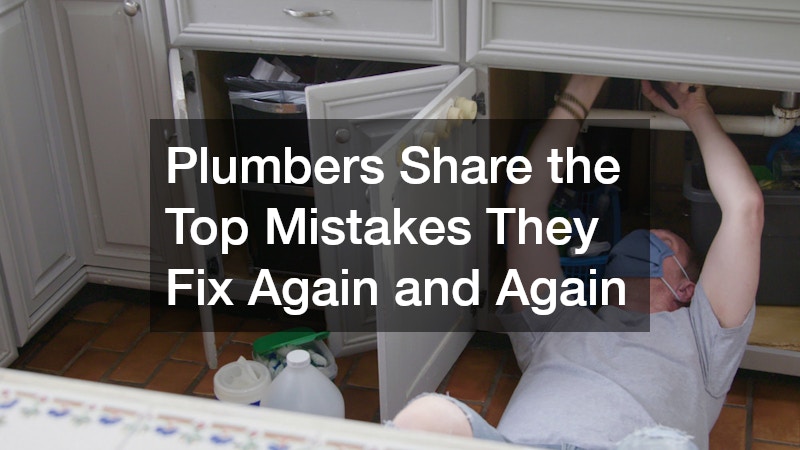
In this article, we explore the common plumbing mistakes that both DIY enthusiasts and homeowners make, and the insights shared by professional plumbers on how to avoid them. Understanding these pitfalls can save you time, money, and frustration.
Video Source
One of the most frequent mistakes made by DIYers is overtightening plumbing connections. While the intention is often to ensure a watertight seal, excessive torque can lead to damage. Stripped threads or cracked fittings are common consequences of this action.
Professional plumbers often advise to tighten connections just enough to create a seal without applying undue stress. Using hand tools rather than power tools can help maintain a better feel for the proper tightness. Recognizing the limits of force is crucial for preserving the integrity of plumbing systems.
Another mistake commonly observed by plumbers is ignoring local building codes and plumbing regulations. Each area has specific guidelines designed to ensure safety and functionality. Homeowners must familiarize themselves with these rules before commencing any plumbing project.
Failing to comply with local codes can result in costly fines and necessitate further plumbing work to rectify non-compliant installations. Professional plumbers recommend checking with local authorities or consulting a plumber when in doubt. This diligence can save significant complications down the line.
The choice of tools is fundamental in plumbing tasks. Using the wrong tools not only complicates the project but can lead to botched repairs or damage. Plumbers assert that having the right tool for each specific job is essential for effective work.
For example, using improper wrenches or pliers can strip fittings, making future repairs tremendously more difficult and costly. Investing in quality tools designed for plumbing applications pays off by ensuring the job is done right the first time. It is wise to take the time to gather the appropriate equipment before starting.
One common source of leaks in plumbing systems is the improper sealing of joints. Whether using tape, thread sealant, or other techniques, the method must be appropriate for the application. Moisture can easily seep through poorly sealed connections, leading to extensive water damage.
Contractors emphasize the importance of selecting the right sealing materials and methods for the specific piping involved. Inadequate attention to detail during the sealing process may lead to leaks. Investing time upfront to understand proper joint sealing can prevent headaches later.
Homeowners often underestimate the importance of regular plumbing maintenance. Just as you would tune up a car or service an appliance, your plumbing requires ongoing attention. Failing to conduct routine checks can lead to major problems over time.
Professional plumbers recommend setting up a schedule for inspections and maintenance tasks. Simple actions like checking for leaks, cleaning fixtures, and inspecting hoses can significantly enhance the longevity of your plumbing system. Regular maintenance can reveal issues early, preventing more significant repairs later.
The use of unapproved materials can lead to a host of plumbing issues. Substituting approved materials with cheaper, inferior options may save money initially, but the long-term repercussions can be severe. Faulty materials can fail, leading to leaks or dangerous conditions.
Chemical drain cleaners are popular tools for addressing clogs, but their improper use is widespread among homeowners. These substances can cause damage to pipes and present safety risks if used incorrectly. Understanding their limitations is essential.
Many professionals recommend avoiding chemical cleaners when possible and opting for mechanical methods instead. Mechanical clearing methods are often safer and more effective in the long run. Knowing how and when to use chemicals can prevent potential disasters that can arise from their misuse.
Small clogs can seem insignificant, but neglecting them often leads to larger problems. It’s crucial to address minor blockages before they escalate into major plumbing crises. Regularly monitoring drains assists in catching small clogs early.
Professional plumbers often see the aftermath of ignoring small clogs—buildups that lead to leaks and costly repairs. Promptly handling small issues helps maintain seamless plumbing functionality. Homeowners should invest time in routine checks and take minor blockages seriously.
Using plumbing snakes incorrectly is a common pitfall for DIYers tackling drain cleaning. These tools require a specific technique to avoid damaging the plumbing. Without proper knowledge, it’s easy to make mistakes that escalate drain issues.
Some plumbing issues are beyond the scope of a DIY fix, resulting in the need for a professional plumber. Identifying the complexity of a problem can save significant time and stress. Understanding your limits is essential in any homeowner's arsenal.
Professional plumbers are trained to handle intricate plumbing challenges that require expertise and specialized knowledge. From advanced leak detection to system installations, their experience offers invaluable support. Knowing when to call in the pros can prevent costly mistakes.
The cost of DIY damage can quickly exceed any imagined savings. Many homeowners underestimate how expensive a poorly executed DIY project can become. From simple leaks to major plumbing failures, the financial toll can be substantial.
Professional plumbers find that many call them only after a DIY effort has exacerbated the original problem. Understanding this risk can help homeowners make informed decisions about repairs. Sometimes, the cost of hiring a professional upfront is significantly less than repairing damage from DIY attempts.
Each homeowner should know their capabilities when it comes to plumbing repairs. Recognizing when a project exceeds your skill level is essential for preventing further complications. Knowing your limits is a core component of effective home maintenance.
